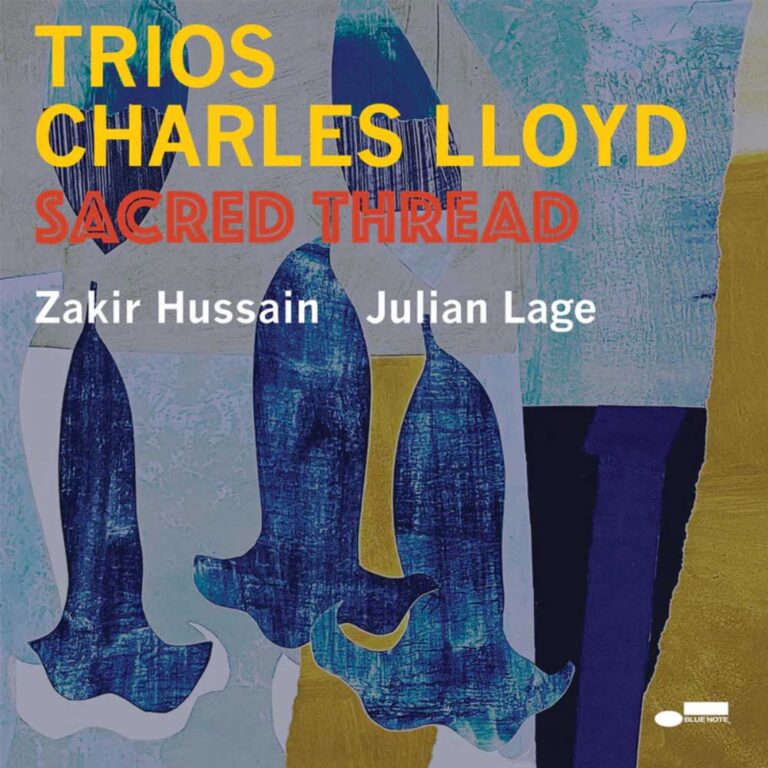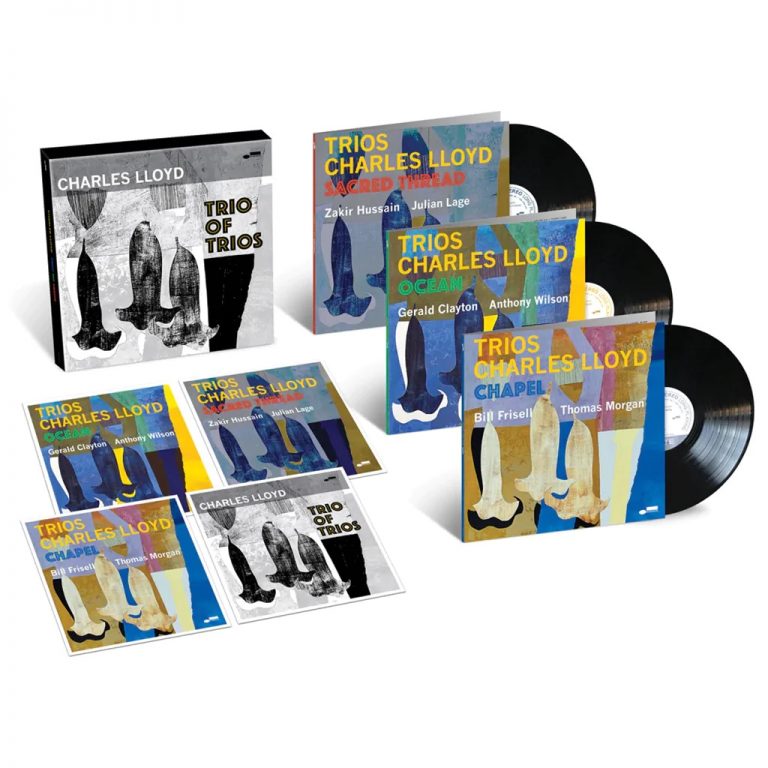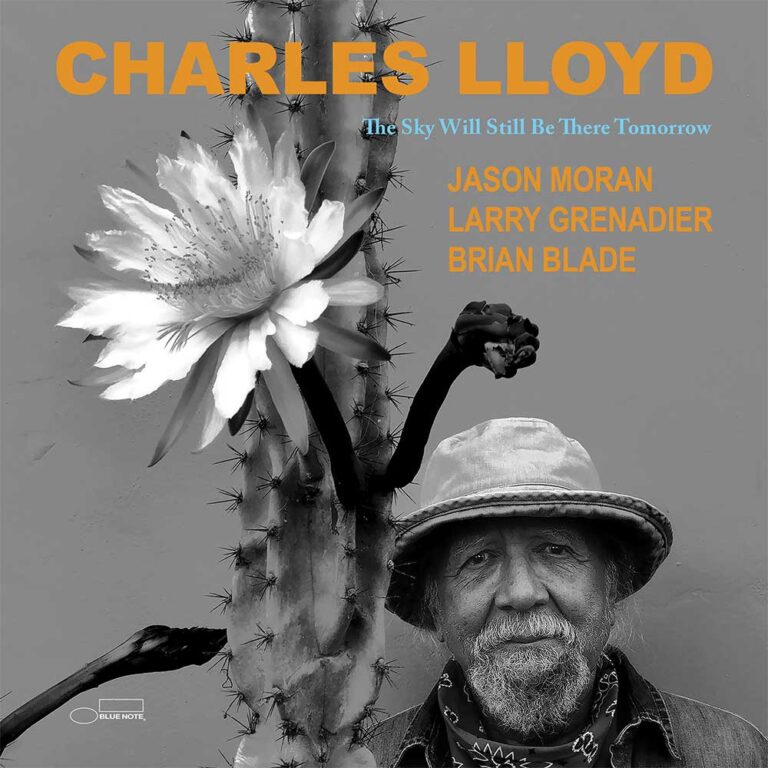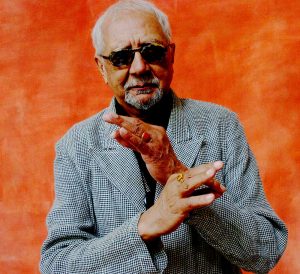“When I was studying at the University of Southern California, Ravi Shankar and [Indian tabla player] Alla Rakha used to come around. That’s when I heard the call of Mother India,” Charles Lloyd recalled in the press release of his 2022 album “Trios: Sacred Thread”. “Zakir (Hussain) and I played together in concert for the first time in 2001, and it was then I learned Alla Rakha was his father, so it has been like that… connections on a journey. You could call it Providence, I call it a Sacred Thread.”
Recorded with the tabla master Zakir Hussain and guitarist Julian Lage when Charles Lloyd was 84, “Sacred Thread” was the final part of a “Trio of Trios”, three albums that presented the saxophonist, flautist and early global music pioneer in a range of different trio settings.

CHARLES LLOYD Sacred Thread
Available to purchase from our US store.
CHARLES LLOYD Trio of Trios
Available to purchase from our US store.It was a thread that stretched back to the 1960s when the Memphis raised but Californian based Lloyd started incorporating cadences from other cultures into his compositions. He became best known for his albums for Atlantic, “Love In,” “Journey Within” and “Forest Flower “ (live at Monterey Jazz Festival with bassist Cecil McBee, drummer Jack De Johnette and pianist Keith Jarrett) that provided a jazz soundtrack to the Summer of Love.
Despite the success of these albums, by 1970 Lloyd had hit a wall. “I had lost my way musically and spiritually and I was off my course [and] I just knew that I had to go away and find a foundation,” he told Classical Voice website in 2018. That foundation was the teachings of Vedanta, a spiritual philosophy he explored on a transformative visit to India.

His spiritual quest also became a musical one, leading to the Indian infused modal/fusion album “Geeta” from 1973 featuring dholak players Aashish and Pranesh Khan, the sons of sarod player Ali Akbar Khan whose music had a profound effect on Lloyd.
Apart from Atlantic, the label Charles Lloyd is most associated with is ECM, where he returned to in 1989 with the album “Fish Out of Water”. It was his first release after being debilitated by a serious medical condition in the early 1980s.
He went on to record over 10 albums with ECM producer Manfred Eicher including “Sangam” from 2006 – his debut recording with Zakir Hussain. He had first witnessed the power of the tabla maestro at a concert by John McLaughlin’s Shakti. “When I heard Zakir it had the effect on me like hearing Howling Wolf. I was shaking inside, it reverberated so strongly,” he told Blue Note’s Don Was for his First Look YouTube series. “ I couldn’t wait for us to play together…We had a synchronicity and a beautiful musical sharing beyond words.”

Recorded with drummer Eric Harland, “Sangam” was followed by a number of live trio performances with Hussain but “Sacred Thread” was their first recording together since that ECM outing.
Charles Lloyd’s most explicit exploration of Eastern music to date, the album was a notable departure from the previous two of the series “Chapel” (with guitarist Bill Frisell and bassist Thomas Morgan) and “Ocean” (with guitarist Anthony Wilson and pianist Gerald Clayton). Through these three albums you get both a sense of the deep and diverse oeuvre of Charles Lloyd and his mastery of the trio setting.

CHARLES LLOYD The Sky Will Still Be There Tomorrow
Available to purchase from our US store.“Sacred Thread” opened with the beautiful ballad “Desolation Sound” named after a marine park in British Columbia, Canada, where Lloyd had visited with an old friend. From the first notes it was clear that at the age of 84 Charles Lloyd had lost none of his dexterity or richness of tone, veering from long mournful passages to short sharp phrases.
The album’s spiritual peak was ‘Nachekita’s Lament’ a deep meditation that layered Hussain’s devotional chanting and tabla around the plaintive flute of Lloyd and exploratory guitar of Lage. Elsewhere on ‘Kuti’ we hear the beauty of Lloyd’s flute while on ‘Saraswati’ he plays the Hungarian soprano style tárogató. It’s just one of the many wind instruments from around the world he has mastered over the last five decades as a “sound seeker” creating music for the good of humanity.
“It’s ineffable, this music and what it does. It heals hearts,” he concluded to Don Was. “Many of us are wounded souls and need to look after each other and music has always done that for me.”
Read On…Ancestral Echoes – Nduduzo Makhathini’s “In the Spirit of Ntu”
Andy Thomas is a London based writer who has contributed regularly to Straight No Chaser, Wax Poetics, We Jazz, Red Bull Music Academy, and Bandcamp Daily. He has also written liner notes for Strut, Soul Jazz and Brownswood Recordings as well as storyboards for short films at RBMA.
Header image: Charles Lloyd. Photo: D. Darr.


